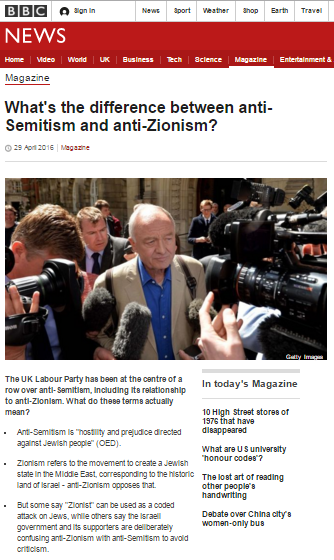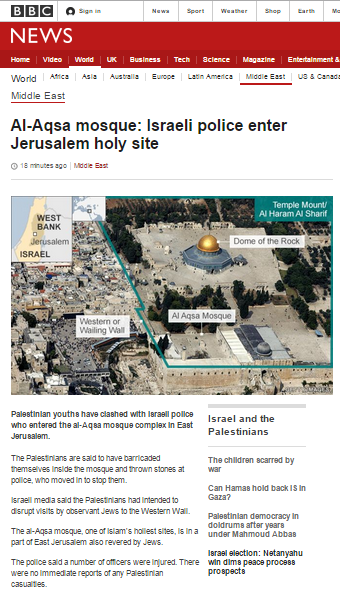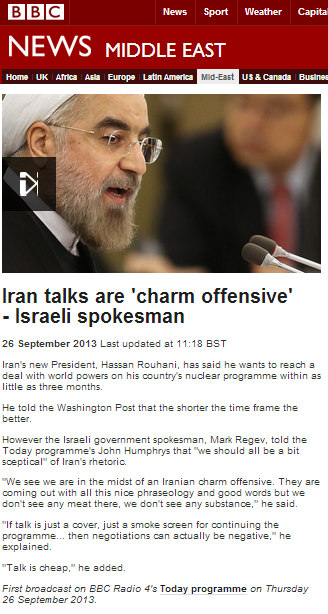As regular readers of BBC Watch know, the corporation has a pretty gloomy record when it comes to preventing, identifying – and correcting – antisemitic discourse in its own content. BBC programmes were adduced in two reports published last year by expert practitioners tackling the issue of antisemitism in the UK – the February 2015 Report of the All-Party Parliamentary inquiry into Antisemitism and (not for the first time) the Community Security Trust’s annual report on Antisemitic Discourse.
On several occasions the Board of Deputies of British Jews has found it necessary to comment on issues concerning BBC content, including the corporation’s rejection of complaints relating to antisemitic remarks made by one of its reporters in January 2015 following the terror attacks in Paris. As has been noted here on numerous occasions, BBC-run message boards and phone-in shows have become fora for the spread of hate speech, dehumanization and delegitimisation of Jews, Israelis and Israel.
So when, in March, the UK Labour party’s burgeoning antisemitism scandals prompted British journalist Nick Cohen to write about antisemitic conspiracy theories we asked:
“Is it really at all surprising that the adoption of such conspiracy theories by the “leftwing activists, institutions or academics” described by Cohen is so widespread when we consider that the broadcaster with the most extensive access to British audiences is not averse to mainstreaming such ideas?”
One might of course argue that the BBC’s public purpose remit – which includes “sustaining citizenship and civil society” and “promoting education and learning” – should have gone some way towards both preventing the appearance of antisemitic discourse in its own content and helping raise the British public’s awareness of antisemitism, thereby ensuring that ideologies such as those which have brought the Labour party into disrepute of late would be relegated to the status they deserve rather than becoming so commonplace within a mainstream British political party.
That, however, is obviously not the case and one of the reasons for that (as noted in BBC Watch’s submission to the DCMS public consultation concerning the renewal of the BBC charter) is that the BBC itself does not work according to an accepted definition of antisemitism. That is why the British public sees notions such as “the Palestinians suffer hugely at Jewish hands as well” mainstreamed on their television screens. That is why conspiracy theories such as the claim that in America “all of politics is in thrall to the Jewish lobby” are mainstreamed on BBC radio and that is why antisemitism in certain sectors of British society has often been whitewashed and ignored by the BBC.
Little wonder then that the BBC has to date repeatedly shown itself to be incapable of adequately explaining to its audiences exactly why comments made by some UK politicians and public figures are racist and offensive.
Despite its own dismal record and the plethora of evidence showing that the BBC does not have the authority or the expertise – let alone the remit – to define antisemitism, on April 29th it nevertheless decided to do just that in an article published on the BBC News website under the title “What’s the difference between anti-Semitism and anti-Zionism?“.
Readers are not informed who wrote that backgrounder – which, ironically, opens with promotion of the Livingstone Formulation.
“The UK Labour Party has been at the centre of a row over anti-Semitism, including its relationship to anti-Zionism. What do these terms actually mean?
Anti-Semitism is “hostility and prejudice directed against Jewish people” (OED).
Zionism refers to the movement to create a Jewish state in the Middle East, corresponding to the historic land of Israel – anti-Zionism opposes that.
But some say “Zionist” can be used as a coded attack on Jews, while others say the Israeli government and its supporters are deliberately confusing anti-Zionism with anti-Semitism to avoid criticism.” [emphasis added]
Readers may recall that in recent weeks we have seen the Livingstone Formulation similarly promoted on BBC Radio 4 and in an article written by none other than the BBC’s politics correspondent. The device is twice promoted again later on in the article.
“Others – including Livingstone – argue anti-Zionism is not the same as anti-Semitism, and that it’s wrong to mix up anti-Jewish prejudice with legitimate disagreement with the actions of the Israeli state.”
And – bizarrely citing a known anti-Israel activist:
“On the other hand, it’s regularly claimed that accusations of anti-Semitism are deployed to silence criticism of the Israeli government or to further other political ends.
Pia Feig, of Manchester Jews for Justice for Palestinians, told BBC Radio 2’s Jeremy Vine programme that “anti-Semitism has been used to quieten down and suppress my concern and the concern of other people for Palestinians”.”
Of course anti-Zionist is not an accurate description of people who criticize the policies or actions of the Israeli government: were that the case, Israelis themselves could be regularly described as ‘anti-Zionist’. Rather, anti-Zionists are those who – for assorted reasons – hold the opinion that the Jewish state should not exist: i.e. that Jews have no right to self-determination like other nations.
Revealingly though, the term ‘self-determination’ appears only once in this article in a quote:
“Baroness Julia Neuberger told the BBC’s Jeremy Vine show that anti-Zionism implies “Jews have no right to self-determination, unlike other people”.”
With that exception, the article focuses on promoting the inaccurate and misleading notion that anti-Zionism is the same thing as expressing criticism of the policies and actions of the Israeli government.
Thus, we not only see that whoever wrote this backgrounder is inadequately informed on the subject of anti-Zionism and hence fails to deliver the headlined promise to explain it to readers, but also that the BBC’s failure to work according to an accepted definition of antisemitism means that the writer also neglects to inform them that the EUMC Working Definition, for example, specifically describes denial of the Jewish people’s right to self-determination as antisemitism.
To make matters even worse, the article amplifies the ‘Zionism is racism’ canard and the ‘apartheid’ fabrication whilst linking to the website of the PSC – an organization which supports and enables the efforts of an openly antisemitic terrorist organization which seeks to destroy the Jewish state.
“Some anti-Zionists say Zionism itself is a racist ideology, because of how, in their view, the Palestinian people have been treated by the Israeli state. The Palestine Solidarity Campaign says it opposes all racism, including anti-Jewish prejudice and the “the [sic] apartheid and Zionist nature of the Israeli state” – although the PSC has itself been accused of racism for its anti-Zionist stance.”
And if you want to understand just how reluctant the BBC actually is to inform its audiences comprehensively, accurately and impartially about the UK Labour party’s malaise, then consider this article’s airbrushed, benign portrayal of the Facebook post that led to Naz Shah’s suspension.
“It follows the suspension of Bradford West MP Naz Shah after it emerged she had once suggested, among other things, that Israel should be moved to the United States.”
In fact, what Naz Shah was supporting is the ethnic cleansing of Jews from the Middle East but the BBC does not have the honesty and integrity to inform its audiences of that fact. It instead whitewashes the true meaning and significance of comments made by her and others whilst at the same time failing to provide audiences with a clear and accurate explanation of anti-Zionism which would enhance their understanding of what the scandals currently engulfing the UK Labour party are actually about or where their long-existing roots lie. Moreover, it further muddies the waters with repeated promotion of the Livingstone Formulation: a device deliberately intended to discredit those raising concerns about antisemitism.
There is nothing very surprising about that given the BBC’s record on antisemitism and its past repeated failure to inform audiences what anti-Zionist groups such as the PSC and the BDS campaign really stand for despite frequently showcasing their agendas. But what this so-called backgrounder does demonstrate once again is that (notwithstanding beacons of light such as Andrew Neil) the BBC is currently incapable of properly serving its funding public’s interests on this topic.
Related Articles:
Mainstreaming the Livingstone Formulation on BBC Radio 4
BBC promotes the Livingstone formulation – again
Andy Newman’s socialism of fools: The remarkable staying power of leftist antisemitism (UK Media Watch)
Jews, Israel, & the Atavistic British Left: A response to Bob from Brockley (UK Media Watch)




